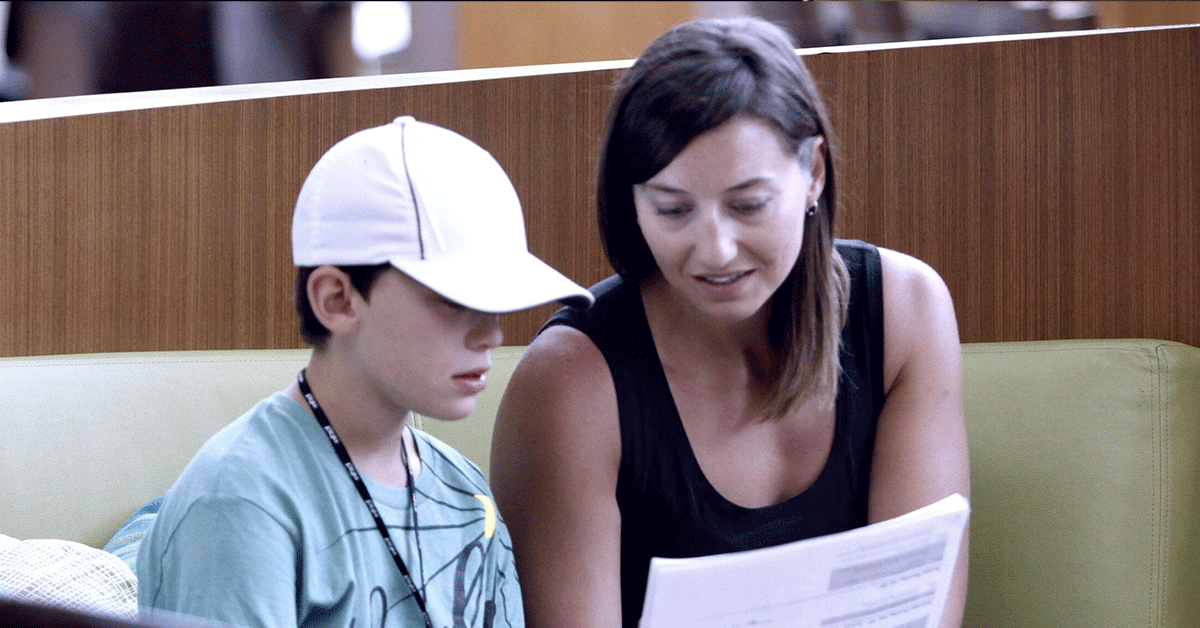Individuals with Fragile X syndrome often have difficulty establishing meaningful friendships. Limited social skills, social anxiety, and an often narrow range of interests contribute to these difficulties. Here, we discuss various interventions that can increase their social network.
Building Early Social Skills for Making Friends
Parents are in a unique position to assess their child’s social strengths, weaknesses, and interests and to provide “real life” intervention across childhood.
If there is a second child in the home, they may serve as a play partner who can help them rehearse social skills. Basic social skills such as greetings, taking turns, making requests, and simple negotiation can be rehearsed at home, thereby increasing the opportunities to use those skills with peers outside the home.
Parents may need a systematic approach to foster friendships for their children, but the earlier social connections are made a priority, the more success a child can have. Parents may also want to make an extra effort and reach out to other parents in the neighborhood or at school.
Parents may need to advocate for their child by explaining Fragile X syndrome and its core symptoms to other parents. By fostering these relationships, it may be easier and more comfortable for the children to get together as peers are more accepting of special needs during the younger years. When relationships are established early, they can pave the way for social support in the future.
It is important to keep in mind that concerning friendships, quality is more important than quantity. Like other children, those with Fragile X syndrome benefit from a range of friendships, from acquaintances to best buddies. In addition, when choosing supportive interventions, parents need to consider individual factors such as the degree of social anxiety, social interest, behavioral perseveration, and frequency of outburst behavior. It is best to schedule only one friend over at a time, to keep the sensory stimulation and social demands at a tolerable level.
Most of the adults with Fragile X syndrome whom I work with have limited sources for developing lasting friendships. This is true for both genders. For most people, friendships are the outcome of mutual interests, proximity, shared experiences, and similar values or perspectives. This is no different for someone with a developmental disability, but often it seems that existing friendships are based more on proximity than on shared interests. Children often develop friendships based on familiarity, due to mutual placement in special education or inclusion programs.
Individual Psychotherapy or Behavioral Therapy
While the term “psychotherapy” is often reserved for insight-oriented mental health support and interpersonal change, the act of meeting with a mental health therapist for support can be helpful for those with Fragile X syndrome. It can be a vehicle for reviewing social situations, making a plan, and then implementing new social skills. Once skills are learned in a one-to-one setting, they can be applied elsewhere.
Experience with Fragile X syndrome is not a prerequisite for the therapist, but they would benefit from learning more about it. People with Fragile X syndrome have a variety of mood, attention, impulse control, anxiety, and regulatory deficits that can lead to behavior problems and interfere with social adjustment. Often these individuals need an ally to translate their underlying symptoms and help explain the triggers of behavioral and social difficulties. Involvement with a therapist can reduce anxiety because the individual feels more supported.
Visual Supports
Visual cues and strategies can help make therapy more concrete and are very important in reducing the load placed on working memory. It is difficult for people with Fragile X syndrome to follow a complex conversation and track verbal information, which many traditional therapies emphasize. Drawing or diagramming a topic as it is discussed can be very helpful. Not only does it help focus visual attention, but it also provides a format for reviewing previous discussions. The therapist does not need to be an artist. Simple stick figures can go far in representing a verbal idea visually and making the conversation more concrete.
Writing out simple words to go along with key ideas serves to organize memory about the conversation. This technique is equally effective when parents use it to facilitate discussions with their children or when teachers use it to highlight an idea with students. It can be very helpful in diagramming a social situation or rehearsing appropriate ways to respond socially. Paper can be kept in a file for a review of previous sessions or ideas. A dry-erase board is nice because it is more fluid. If a mistake is made (clients often correct drawings), a dry-erase board can be edited more easily.
Social Scripting
The social anxiety that most individuals with Fragile X syndrome face interferes with their ability to engage in relationship-building activities. Despite the developmental gains made as people grow older, those with Fragile X syndrome often continue to feel overwhelmed by social interactions. They may have difficulty starting conversations, responding to direct questions, or handling common social situations. On the plus side, they often respond well to social scripting, in which an adult, such as a parent, teacher, or therapist, scripts and then rehearses certain interactions. This allows the person with Fragile X syndrome to memorize the desired social response, decreasing the likelihood of some other less desirable response.
For example, Frank may tell his parents he would like to invite Steve, a peer from school, to go bowling. Despite truly wanting this, Frank may feel too anxious to ask Steve. A social script can teach him exactly how to approach Steve. It may highlight “when” and “how” so that Frank is more prepared for the encounter. His script may even be written or drawn onto a file card so that Frank can review it before the interaction. He can carry it in a pocket to decrease his relative stress, though even this may not be enough to allow Frank to make the request.
Since no two people are alike, intervention strategies should be tried and then refined as needed. If Frank is ultimately not able to approach Steve, it should not be considered a failure of the intervention. Rather, it is a success because it has provided the information that the level of support was not high enough.
Subsequent strategies might include a familiar adult approaching Steve with Frank, and providing proximal support. It may be that the adult needs to initiate the interaction and make the initial request, with Frank providing additional details as he feels comfortable. Frank might prefer to hand Steve a written invitation or, with help, send an email. All of these options allow Frank to enhance his social skills, and with success, to decrease his social anxiety.
Facilitated Social Interactions
Some individuals with Fragile X syndrome need their interactions with peers to be directly facilitated. This may be particularly true for younger children if they are just starting to have play dates. It may also be true for older children or adults who have had limited social success or who have a history of aggressive behavior patterns. These individuals require supportive scaffolding.
For a play date, it is important to pay attention to structure, organization, and supervision. Structure refers to the specifics of the situation (when, where, what) in concrete terms so that the child knows what to expect. Rather than letting the play unfold, it may be more successful to specify what the children will do. If 6-year-old Joey is having a friend over, what three activities would he like to do? These can be represented using pictures (such as a picture schedule using line drawings or photographs) so that Joey and his friend have a reference point as they progress.
A snack time may be helpful since snacks are almost always popular with children. Finally, there should be a scheduled timeframe. It is much better to keep the first few playdates too short, with the children wishing for more, rather than to have them too long, with the children pushed beyond their sensory and regulatory capabilities.
There should also be adequate supervision and an active adult in the room who can guide the process successfully along. It might mean simply sitting on the sidelines, but it could expand to facilitating turn-taking, sharing, or negotiating. For an adult with FXS, a facilitated social interaction might include a structured social event (baseball game, bowling) where a very similar structure is utilized.
A visual schedule may be helpful. It will be useful to review and predict ahead of time what types of behaviors will be expected and what type of events will occur. This may include expectations regarding snacks, restroom locations, desired social behavior, and whether a souvenir will be purchased. By keeping an eye on structure, facilitators can increase the likelihood of success and help build ongoing social support for the future.
Limited social skills, social anxiety, and a diminished range of interests often interfere with social adjustment despite a person’s desire for social connection. Individuals with Fragile X syndrome often need additional support to create and sustain social relationships within their peer group.







